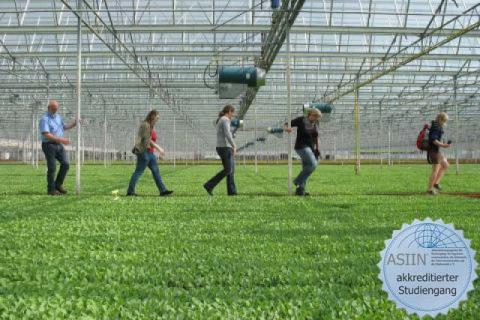Shaping the Future of Agriculture
Since the Winter Semester 2010 / 2011 the Rhine-Waal University of Applied Sciences offers the English language course of study Sustainable Agriculture at their campus location in Kleve. In this path of study the agriculture and horticulture production systems are analyzed and evaluated as a part of the value chain with regard to their sustainability. As an outcome optimization strategies target all the three major areas of sustainability: environmental stewardship, economic profitability and social responsibility.
Key global issues including climate change with changing weather conditions, increasing land degradation and loss of biodiversity will be dealt with as well as the questions of world nourishment, the strong price fluctuations for agricultural products and revenue assurance for farmers and gardeners in a globalised world. At the same time production systems of different value chains from food production to ornamental plants production to renewable raw materials production are looked at and evaluated with different approaches and methods regarding their sustainability in their environmental, economical and social terms. The resulting ethical issues are also addressed in the courses.
What to Expect
Sustainable agriculture is a study course combining technical, natural, economic and social disciplines of science. In a range of interdisciplinary projects, students learn to analyze, evaluate and optimize agricultural and horticultural production systems as integral part of the value chain. In cooperation with companies and institutions this applications-oriented study allows a high level of practical relevance to be reached. Alongside the provision of technical and scientific content and the establishment and development of methodological skills, the social competences of each individual are strengthened.
Self-organized learning as a key competency and as an integral part of a university study is promoted from the outset. Here to a large degree the transfer of professionally qualifying skills and the advancement of personal competences take place through integration and specialization. In doing so, different forms of learning such as lectures, seminars, lab courses, internships, exercises and project works are selected to communicate classical educational content (e.g. soil science, botany, business administration, livestock sales) as well as modern themes of the agricultural branch (e.g. precision farming, energy production, quality management, value chains analysis).
Career Paths
Close contact to companies and institutions results in lectures which provide students with up to date information and practical relevance and provide contact to possible future employers. A broad education and a flexible individual educational profile open doors for graduates into diverse professional opportunities. Potential employers include:
- Consultation and service enterprises
- Nutrition and food industries
- Manufacturers of feed, fertilizers, pesticides and seeds
- Agricultural machinery and plant construction firms
- Associations, administrative bodies and international organizations in the agricultural and environmental fields
The alignment of studies toward sustainability analysis and assessment provides graduates therefore a future-oriented profile with versatile fields of application all along the value chain.
Die Zukunft der Landwirtschaft mitgestalten
Im englischsprachigen Bachelorstudiengang Sustainable Agriculture analysieren und bewerten Sie landwirtschaftliche und gartenbauliche Produktionssysteme als Teil der Wertschöpfungskette hinsichtlich ihrer Nachhaltigkeit und entwickeln Ansätze zu deren Optimierung. Sie betrachten hierbei die Nachhaltigkeit im ökologischen, ökonomischen und sozialen Sinn. Auch die sich daraus ergebenden ethischen Fragestellungen werden in Lehrveranstaltungen thematisiert.
Aufbau des Studiums
Der Studiengang Sustainable Agriculture kombiniert technische, natur-, wirtschafts- und sozialwissenschaftliche Fächer. Die Analyse und Weiterentwicklung von Agrarsystemen wird in vielfältigen interdisziplinären Projekten erlernt und geübt. Durch zahlreiche Kontakte zu Unternehmen und Institutionen des Agrarbereichs im In- und Ausland wird in dem anwendungsorientierten Studium ein hohes Maß an Praxisbezug realisiert.
Dabei erarbeiten Sie sich in aktivierenden Lehrveranstaltungen sowohl klassische Lehrinhalte (z. B. Bodenkunde, Botanik, Betriebswirtschaft, Nutztierkunde) als auch moderne Themen des Agrarbereichs (wie Precision und Urban Farming, nachwachsende Rohstoffe, Qualitätsmanagement, Analyse von Wertschöpfungsketten) und lernen, die Lehrinhalte zu vernetzen und das Erlernte anzuwenden.
Berufsfelder und Kompetenzen
Die breite Ausbildung, eine flexible individuelle Profilbildung und die internationale Ausrichtung des Studiums mit der Englischsprachigkeit eröffnen den Absolventen vielfältige Berufschancen. Mögliche Arbeitgeber sind u.a.:
- Beratungsunternehmen
- die Ernährungsindustrie
- Hersteller von Futtermitteln, Düngemitteln, Pflanzenschutzmitteln und Saatgut
- landwirtschaftliche Maschinenbauer
- Verbände und Behörden
- Organisationen im Umwelt-, Entwicklungs- und Agrarbereich
Die Ausrichtung des Studiums auf Methoden der Nachhaltigkeitsanalyse und -bewertung bietet den Absolventen ein zukunftsweisendes Profil mit vielseitigen Einsatzgebieten entlang der Wertschöpfungskette.
Der Studiengang Sustainable Agriculture kann berufsbegleitend studiert werden.


